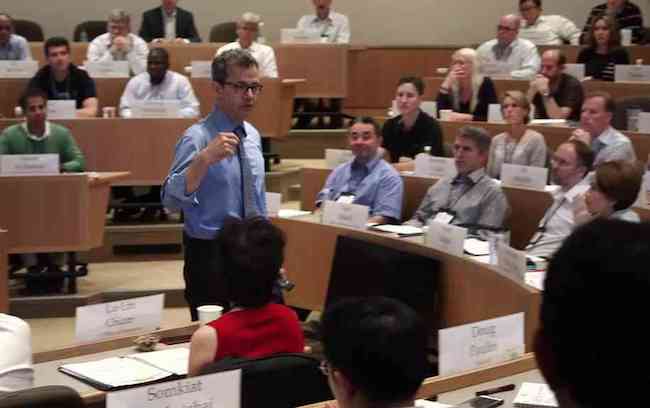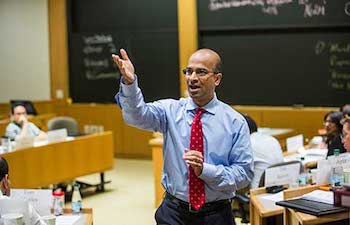
Stuart Gilson will be among four faculty to take part in a HBS Executive Education program on mergers and acquisitions in January. Courtesy photo
Merger and acquisition activity is at record levels and shows no sign of slowing, a fact that is changing the competitive landscape worldwide, says Guhan Subramanian, H. Douglas Weaver professor of business law. Now a new Harvard Business School Executive Education program aims to give C-Suite executives and others a better sense of the transformations taking place, as well as the frameworks and skills they’ll need to create shareholder value and drive growth.
HBS Executive Education will launch Mergers and Acquisitions: Strategy, Execution, and Post-Merger Management on the HBS campus in Boston from January 15-20, 2017. The program, chaired by Subramanian, is designed to help executives understand the M&A process, from strategy and valuation to execution and post-merger management.
“M&A has become much more essential to the overall leadership toolkit than it was 40 years ago,” Subramanian says in a Q&A at the Harvard Executive Education website. “It’s central to every CEO and every board member in every industry who faces complex challenges, including hedge-fund activism, hostile takeovers, and cross-border deals. So we designed the cross-functional curriculum to meet the needs of these diverse business leaders — from C-Suite executives, directors of public and private companies, and M&A advisers to investment bankers, transactional lawyers, and private equity investors.” Executives from both the public and private sectors are encouraged to attend the program, for which applications are currently being accepted.
AREAS WHERE MANY EXECUTIVES LACK TRAINING

Guhan Subramanian. Courtesy photo
The new program is designed for senior executives in the C-Suite, directors of public and private companies, board leaders, and heads of strategy and corporate development — but not only them, Subramanian says. Advisers, investment bankers, transactional lawyers, and private equity investors also would likely find it instructional; individuals and teams are welcome to attend.
Using case studies on leading global companies and exploring best practices for navigating complex deals, the program will seek to provide a view of the M&A process across disciplines, Subramanian says. Participants will examine challenges and opportunities presented by hedge-fund activism, hostile takeovers, restructurings, corporate governance, and more, and the program also will addresses valuation and analysis methods, negotiation, financing, strategy, and post-merger management — areas in which many executives have never had systematic training, as Subramanian points out.
“Driving growth through M&A is vital to CEOs and board members across industries, so we designed our curriculum to meet the needs of a diverse set of business leaders,” he says. “Our overall goal is to show that negotiation is bigger than just the bargaining table. We do this by training executives in valuation, strategy, and post-merger management, allowing them to gain a strategic advantage in all areas of M&A.”
‘ROADMAP FOR SUCCESS’
 The six-day course will cost $15,000, which covers tuition, books, case materials, accommodations, and most meals. In addition to discussions with industry peers and examinations of real-world case studies from global companies, the program will feature top HBS faculty, including Subramanian; David G. Fubini, senior lecturer and Henry B. Arthur fellow; Stuart C. Gilson, Steven R. Fenster professor of business administration; and Kevin P. Mohan, senior lecturer of business administration.
The six-day course will cost $15,000, which covers tuition, books, case materials, accommodations, and most meals. In addition to discussions with industry peers and examinations of real-world case studies from global companies, the program will feature top HBS faculty, including Subramanian; David G. Fubini, senior lecturer and Henry B. Arthur fellow; Stuart C. Gilson, Steven R. Fenster professor of business administration; and Kevin P. Mohan, senior lecturer of business administration.
“Our overall goal was to show that the negotiation is bigger than just the bargaining table,” Subramanian says in describing how the course curriculum was designed. “To do this, we ask participants to consider not only the dynamics in the room, but also how to arrange the chessboard in a way that gives them a strategic advantage before they even step into the room.
“We also want everybody to leave with a more rounded toolkit. For example, bankers may be world experts on finance, but might not understand negotiation in a formal way. On the other hand, a CEO would typically have deep operational expertise, but not as much skill in the financial negotiation. This program provides everyone with a more systematic approach and a broader toolkit.”
Adds Frances Frei, UPS Foundation professor of service management and senior associate dean for executive education at Harvard Business School: “Executives must remember that completing a successful merger or acquisition is not the job of one person. Managing a successful merger or acquisition requires collaborative efforts to identify targets, perform valuations and due diligence, close the best deal, and integrate employees efficiently. This program equips executives with a roadmap for M&A success.”
DON’T MISS MEET HARVARD’S MBA CLASS OF 2018 and HARVARD BOOSTS MBA SUPPORT TO $33 MILLION





Questions about this article? Email us or leave a comment below.